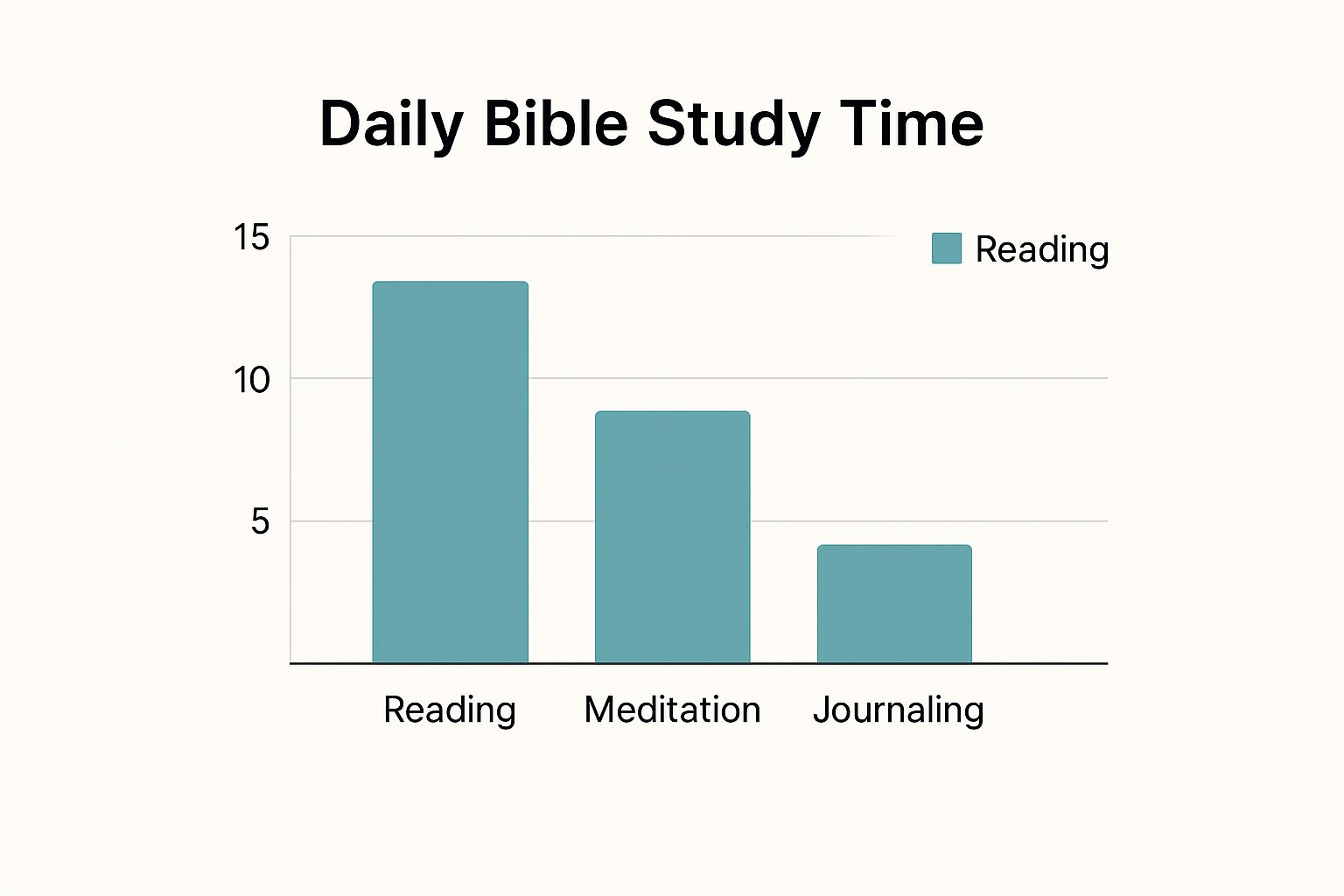
How to Study Bible Like a Scholar: Proven Methods That Work
Building Your Bible Study Foundation Without the Intimidation
The secret to effective Bible study isn't about knowing everything; it's about asking good questions. It's about connecting with the text in a way that resonates with your life, no matter how busy you are or what your background is. I've spoken with so many people, from working parents to experienced ministers, and one thing holds true: consistency is more important than intensity. A short time each day, approached with sincere curiosity, is much more effective than occasional, guilt-driven marathons.
One easy way to build consistency is by creating a realistic daily routine. If hour-long study sessions just won't fit into your life, don't sweat it. Try a more manageable approach.  This infographic illustrates how just 30 minutes can be broken down into focused segments: 15 minutes reading, 10 minutes meditating, and 5 minutes journaling. It’s a helpful visual reminder of how even short bursts of time can become powerful moments with Scripture.
This infographic illustrates how just 30 minutes can be broken down into focused segments: 15 minutes reading, 10 minutes meditating, and 5 minutes journaling. It’s a helpful visual reminder of how even short bursts of time can become powerful moments with Scripture.
Another essential step is finding a Bible translation that you genuinely enjoy. If your current version feels like homework, it’s time for a switch. A modern translation, such as the New Living Translation (NLT) or the English Standard Version (ESV), can bring new life to familiar passages. Don't hesitate to try different versions and find one that speaks to you. This can significantly impact your engagement with the text and how you approach Bible study.
Choosing The Right Translation
Picking the right translation can sometimes feel overwhelming. To help with that, I've put together a quick guide to a few popular versions, highlighting their strengths and best uses:
Before the table explaining its purpose
This table compares several popular Bible translations, looking at their reading level, style, and best uses for different study approaches.
| Translation | Reading Level | Translation Style | Best For | Key Features |
|---|---|---|---|---|
| New International Version (NIV) | Moderate | Thought-for-thought | General reading, group study | Readability, balance of accuracy and clarity |
| English Standard Version (ESV) | Moderate to Advanced | Word-for-word | In-depth study, academic settings | Accuracy, formal language |
| New Living Translation (NLT) | Easy | Thought-for-thought | New believers, devotional reading | Clarity, contemporary language |
| King James Version (KJV) | Advanced | Word-for-word | Traditionalists, literary study | Beautiful prose, historic significance |
| Message (MSG) | Easy | Paraphrase | Casual reading, getting the big picture | Conversational tone, interpretive |
After the table summarizing key insights
As you can see, different translations offer different benefits. The best choice depends on your specific needs and preferences. The key is to find a translation that makes the text accessible and engaging for you.
The Power of Community
Finding a supportive community can be transformative. Connecting with other people who are also learning and growing provides encouragement, accountability, and new perspectives. Discussing challenging passages with friends or joining a small group can unlock insights you might miss on your own. Sharing your journey builds a sense of shared purpose and reminds you that you’re not in this alone. This has become even more important, particularly with research like the American Bible Society's State of the Bible 2025 report showing increased engagement among millennials. This renewed interest among younger generations emphasizes the value of community in Bible study.
Finally, remember that Bible study is a personal journey, not a performance. It’s about drawing closer to God, not becoming a Bible scholar. Enjoy the process, be patient with yourself, and appreciate the small victories along the way. The most important thing is to come to it with a humble and open heart, ready to hear how God’s word speaks to you. That's the foundation of a truly meaningful Bible study practice.
Finding Reading Rhythms That Actually Fit Your Real Life
Let's be real: those pre-packaged Bible reading plans? They often feel designed for someone with a lot more free time than the average person juggling work, family, and, well, life. I’ve chatted with so many people who feel guilty for "falling behind," and I've realized something crucial: consistency is way more important than intensity. Reading a few verses with intention each day is far better than sporadic marathon sessions.
So, how do you create a rhythm that actually works for you? It's all about adapting, experimenting, and ditching the idea that there's one "right" way. Chronological plans, for instance, are fantastic for understanding the big picture, but they can also bog you down in genealogies or Levitical laws. If that happens, don't be afraid to skip ahead to a more engaging story or switch to a topical study for a bit. The goal is to connect with Scripture, not to check it off a list.
Adapting Popular Methods to Your Unique Style
Even well-known approaches like the SOAP method (Scripture, Observation, Application, Prayer) can be personalized. If you’re a visual learner, try sketching or mind-mapping your observations. More analytical? Dive into the historical context or compare different interpretations. The beauty of these methods is their flexibility.
Your current season of life also matters. During stressful times, a devotional focused on peace might be more beneficial than a deep dive into prophecy. When you’re experiencing personal growth, you might be ready to tackle more challenging theological concepts.
This leads to a fascinating point: how people engage with the Bible differs widely across cultures. The 2025 Patmos World Bible Attitudes Survey showed strong engagement in areas like Sub-Saharan Africa and Latin America, where the Bible has significant influence on daily life. Contrast this with more secular Western societies, where its role is less central. It highlights the diverse approaches to Bible study worldwide. Discover more insights about global Bible engagement here.
Overcoming the Guilt of Falling Behind
One of the biggest hurdles to consistent study is the guilt of falling behind. But remember this: your spiritual growth isn't measured by how many chapters you read. Miss a day? A week? Don't beat yourself up. Simply pick up where you left off, or start something new.
Feeling overwhelmed by a lengthy reading plan? Try breaking it into smaller, more manageable sections. Short on time? Listen to an audio Bible during your commute or while doing chores. There are also tons of online resources, podcasts, and apps designed for busy schedules. The key is to find what clicks for you and let go of the pressure to be perfect.
Building a Sustainable Rhythm
The people I've seen consistently engage with the Bible over time have learned to weave it into their daily routine. They’ve made it a habit, not a chore. They’re also adaptable, adjusting their study methods and plans as life changes.
Ultimately, finding your Bible study rhythm is a deeply personal journey. It's about discovering what connects you with God’s Word and making it a sustainable part of your life. It's not about checking boxes; it’s about cultivating a relationship with God. And that, my friend, is a journey worth taking.

Developing Observation Skills That Unlock Hidden Treasures
Let's be honest, most of us treat our Bibles a bit like our social media feeds. We skim, we scroll, we maybe catch a few headlines, but we often miss the real depth and richness just below the surface. It's like glancing at a stunning tapestry and only seeing the individual threads, never the intricate, beautiful design. There's a better way, though. You can train yourself to study the Bible with a more observant eye, noticing small details that unlock a much deeper understanding. It's about finding those hidden treasures, the ones right there in plain sight. These are the techniques scholars use, but they're also for everyday people like you and me. They can completely transform how you see even the most familiar passages.
Asking the Right Questions: The Key to Unlocking Meaning
Think of Bible study like a detective investigating a case. You wouldn't just read the initial report and call it a day, would you? You’d ask questions! Who are the people involved? What were they thinking? What’s the backstory here? That same curiosity is key when it comes to Scripture. Start by asking things like:
- What words or phrases keep popping up? This often highlights important themes or points of emphasis.
- What kind of literary devices are being used (metaphors, similes, parallelism)? These add layers of meaning, like adding spices to a recipe.
- What was going on historically and culturally at the time? Knowing about ancient customs can shine a light on passages that might otherwise seem obscure.
Take the story of David and Goliath, for example. Just noticing the difference in their sizes misses the real point. David's refusal of Saul’s armor wasn’t a tactical blunder; it was a powerful statement of his trust in God. Observing that detail reveals something crucial about the narrative: faith trumps physical strength.
The Power of Context: Understanding the Ancient World
Remember, the Bible wasn't written in a vacuum. Understanding the historical and cultural backdrop is like turning on a light in a dark room. Suddenly, things that seemed confusing start to click into place.
For instance, a lot of the customs in the Old Testament—like animal sacrifices or purification rituals—might seem strange to us now. But if you do a little digging into the meaning behind those practices, you’ll see how they foreshadowed Christ. You don’t need a PhD in history; you just need to be willing to add a little context.
Cross-References: Connecting the Dots
Cross-references aren't just random footnotes. Think of them as the threads that connect the whole tapestry of Scripture. When you use them strategically, you start to see how different parts of the Bible relate to each other, illuminating themes and revealing deeper meanings.
But just flipping through cross-references at random can be distracting. A better way is to focus on a particular theme or question you’re wrestling with and then use the cross-references to see how different passages speak to that topic. This focused approach is much more effective at building those connections and deepening your understanding of how to study the Bible.
Navigating Difficult Texts: Patience and Persistence
Okay, let’s be real. Some parts of the Bible are just plain tough to understand. You're going to run into passages that seem confusing or even contradictory. It’s tempting to just grab a commentary, but try to resist that urge at first. Wrestling with the text yourself—even when it’s uncomfortable—is where real growth happens.
Try putting the passage into your own words. Look for clues in the surrounding verses. Consider different possible interpretations. This struggle strengthens your observation skills and deepens your engagement with the text. Commentaries can be helpful eventually, but try working through it on your own first.
By practicing these observation techniques, you'll discover amazing treasures hidden within the pages of your Bible. You'll see familiar verses with fresh eyes and find yourself connecting with God's Word on a whole new level. This isn’t about becoming a Bible scholar. It’s about developing a richer, more meaningful relationship with God through His Word. It's about experiencing the living, breathing power of Scripture in your life, every single day.
Capturing Insights That Actually Change Your Life

Ever have that amazing "aha!" moment during Bible study, only to have it disappear by the time Sunday rolls around? I know I have. I've also talked with so many people who have been studying the Bible for years, and they’ve shared some invaluable tips for note-taking and journaling. These aren’t just about writing down information—they’re about truly absorbing what you’re learning and letting it change you. They're about making how to study the Bible a natural part of your life.
There are tons of different ways to do this, from jotting quick notes in your Bible margins to keeping a detailed journal where you can trace themes over time. The important thing is finding what clicks for you. Some folks are visual learners and love things like mind maps or passage diagrams. Others prefer a more analytical approach, outlining key arguments or comparing different interpretations. The point is to internalize the insights, not add another item to your spiritual to-do list.
Finding the Right Method for You
Discovering a note-taking method that works can feel like a bit of a quest. Some methods are too basic, others too complicated. The secret? Experiment! If you're a visual person, try passage mapping. This involves visually charting the connections between ideas in a passage. More of a linear thinker? A simple outline of the main points might be perfect. And if you’re always on the move, a digital note-taking app like Evernote or Notion can be a game-changer.
I used to have trouble remembering the context of different passages. A friend suggested theme tracking, and it was a revelation! I started a separate notebook specifically for recurring themes like "grace" or "forgiveness." Each time I came across one of these themes in my reading, I’d write down the verse and a short reflection. Over time, this has built a rich tapestry of how God speaks about these themes throughout Scripture. It's completely transformed my understanding of how to study the Bible effectively.
The Digital vs. Handwritten Debate
The age-old question: digital or handwritten notes? It’s a tough one! Both have their advantages. Handwriting can boost memory and creates a more tactile experience. Digital notes, on the other hand, are searchable and easy to organize. Maybe the best approach is a hybrid. I often jot down initial thoughts by hand and then later transfer key insights into a digital document. This lets me enjoy the best of both worlds.
To help you explore the different options available, take a look at this table summarizing some popular Bible study note-taking methods:
Bible Study Note-Taking Methods
| Method | Time Required | Best For | Tools Needed | Key Benefits |
|---|---|---|---|---|
| Margin Notes | Low | Quick insights, on-the-go study | Bible, pen | Convenient, readily accessible |
| Topical Journaling | Medium | In-depth study of specific themes | Notebook, pen | Tracks insights over time, reveals connections |
| Passage Mapping | Medium | Visual learners, understanding relationships | Paper, colored pens/pencils | Visual representation of connections |
| Outlining | Medium | Linear thinkers, analyzing arguments | Notebook, pen | Organizes key points, clarifies structure |
| Digital Notes | Medium | Searchability, organization, collaboration | Note-taking app (Evernote, Notion, etc.) | Easy access, sharing, flexibility |
This table highlights the variety of methods available and can help you choose one that aligns with your learning style and time constraints. Experimenting with different approaches is the best way to find what resonates with you.
From Observation to Application: Making It Personal
Remember, studying the Bible isn’t just about knowing what the passage says, but about how God is speaking to you specifically. Don’t limit yourself to recording facts. Write down your personal responses, your questions, and any areas where you feel convicted. How does this passage connect with your life right now? Your relationships? Your challenges? This personal connection is what transforms Bible study from an intellectual exercise into a truly life-altering experience.
Organizing Your Insights for Future Reference
As your notes grow, having a good organizational system becomes crucial. Digital notes can be tagged and searched, while handwritten notes can be kept in binders or notebooks. Personally, I like using a combination. I have a digital database for detailed study notes and a handwritten journal for personal reflections and prayers. This makes it easy to find what I need, whether it’s a specific theological point or a personal reflection from a particular time in my life. It also helps me see patterns in how God is consistently working in my life through His Word.
By discovering note-taking and journaling methods that work for you, you'll not only remember what you study, but you’ll also understand it on a deeper level and apply it more effectively to your life. It's about catching those flashes of insight and weaving them into the tapestry of your faith. It’s about making your Bible study time a genuine conversation with God.
Transforming Study Time Into Sacred Conversation
I've learned from so many people over the years, people who've truly made their Bible study a living, breathing part of their faith, that the real transformation happens when we move from just reading to actually conversing with God. Think about it: the Bible isn’t just some dusty old text, it’s a living word! It’s an invitation to dialogue with the God who loves us and wants to speak directly to our hearts. This means actively inviting the Holy Spirit into our study, asking Him to shine a light on truth and guide our understanding.
Starting With Expectant Prayer: Opening the Door to Divine Insight
How do you usually start a conversation with a close friend? You probably wouldn't just launch into a monologue. You'd greet them, ask how they're doing, and make space for them to share. Prayer is much the same. It’s how we acknowledge God’s presence and invite Him into the conversation. Before you even open your Bible, a simple prayer like, "God, speak to me. Show me what you want me to learn from this," can totally change the atmosphere of your study time. You’re setting the stage for a two-way exchange, not just a one-way lecture.
For me personally, praying before I study has been revolutionary. I used to approach Bible study like an academic exercise, all about analysis and interpretation. Now, it’s a time of opening my heart and listening for God’s voice in my life. It's made my time in Scripture so much more personal and meaningful.
Creating Space for the Holy Spirit: Listening Beyond the Words
Once we’ve invited the Holy Spirit in, we need to give Him space to actually speak. This means slowing down, resisting the urge to race through chapters, and really sitting with the words. Contemplative reading is a game-changer here. Instead of skimming, try reading a short passage several times, looking for something new each time. What phrases stand out? What feelings come up? What questions does it spark in your mind?
Another helpful practice is using breath prayers. Pick a short phrase from the passage that resonates with you and repeat it as you breathe in and out. This is such a simple way to weave Scripture into your everyday life, keeping God’s word close to your heart throughout the day.
Responding to God's Word: Dialogue, Not Just Monologue
As we read and reflect, we should be responding to God’s word—talking back to Him, essentially. This might look like thanking God for a promise, wrestling with a challenging command, or surrendering some part of your life to His will. It's about interaction, not just absorption. A Psalm of praise might fill you with gratitude, while a prophetic passage might lead you to repentance. The important thing is to listen and respond from the heart.
I remember one time when I was facing a really tough decision. As I prayed and read my Bible, one verse just seemed to leap off the page. It wasn't a lightning bolt from heaven, but a quiet whisper guiding me in the right direction. It taught me that God often speaks in the still, small voice, not in the booming thunder. It’s in the quiet moments of reflection and prayer that we learn to recognize His voice.
Real-World Examples: Hearing God Speak Through Scripture
So many people have stories of how God has spoken to them directly through the Bible. I have a friend who felt God leading her to a whole new career path through a parable she’d read countless times before. Another friend found comfort and guidance in the Psalms during a season of deep grief. These real-life experiences show how powerful it can be to approach Bible study as a sacred conversation. It's not about finding secret codes, but about opening your heart and listening for God's guidance. Through this constant dialogue, we not only learn about God, we learn to hear Him, and that deepens our relationship with Him and empowers us to live out our faith in practical ways. That's how Bible study truly changes us.
Growing Through Community Without Losing Your Voice

Personal Bible study is essential, but studying with others adds a whole new dimension. It's like revisiting a favorite book with a group of friends – suddenly you see things you never noticed before. I’ve spoken to many people involved in group Bible studies, and the common thread is how much accountability and insight they gain from the shared experience. Those discussions, the questions that arise, often lead to the most profound "aha!" moments.
Of course, not just any group will do. Finding the right community can make all the difference. Maybe it’s a small group at your church, or perhaps it’s a group of friends or coworkers. The key is an environment where everyone feels comfortable sharing, asking questions, and growing together.
Finding or Creating a Study Community That Works for You
When looking for a study group, consider what you want to get out of it. Deep dives into Scripture? Or a more relaxed setting for shared reflection? Big group discussions? Or smaller, more intimate gatherings? Matching the group’s style to your learning style and spiritual goals is crucial.
And if the perfect group doesn’t exist? Start your own! It can be as simple as inviting a few friends over for coffee and Bible study. Your church, online communities, or even local bookstores can be great places to connect with others. Don’t hesitate to take the initiative!
Contributing Meaningfully, Even When You Feel Intimidated
I know firsthand how intimidating it can be to join a group, especially if you feel like everyone else knows more than you. It’s easy to let those feelings of inadequacy silence you. But here's the truth: every perspective matters. Your questions, your struggles, even your doubts, can enrich the group's understanding. No one has all the answers, and everyone's insights are valuable.
Meaningful contributions don’t always mean having deep theological interpretations. Sometimes the most impactful moments come from asking simple questions or sharing how a passage personally touched you. It’s that vulnerability and authenticity that truly connects us.
Navigating Disagreements With Grace and Humility
Disagreements about interpretation will happen – it's part of the process. The key is to approach those differences with grace and humility. The goal isn't to "win," but to learn from each other. Listening respectfully to others, even when you disagree, can open your mind to new insights.
Instead of arguing, focus on understanding the why behind differing interpretations. What experiences or beliefs are shaping their perspectives? Asking clarifying questions can help bridge divides and make the conversation more constructive.
Supporting Each Other's Spiritual Growth
A good study community is one of mutual support and encouragement. It's a place where we can grow in faith together and apply biblical truth to our lives. Celebrating victories, offering support during tough times, and holding each other accountable are all part of it. We're all on this journey together.
And that shared journey is incredibly rewarding. Seeing how God works in others’ lives strengthens our own faith. Having that support system can be a powerful source of strength and encouragement.
Practical Strategies for Building a Thriving Study Group
Building a successful, long-lasting study group takes intentionality. Here are a few tips:
- Choosing the Right Materials: Select materials accessible to everyone, regardless of their Bible knowledge. Look for resources with discussion questions or varied levels of engagement.
- Establishing Ground Rules: A few simple ground rules upfront can create a safe and respectful environment. This might include confidentiality, active listening, and respecting different viewpoints.
- Handling Personality Conflicts: Conflicts happen. Having a designated facilitator or a process for handling conflict can prevent small disagreements from escalating.
By putting these strategies into practice, you can build a vibrant community that deepens your understanding of Scripture and helps you live it out. Studying the Bible together is about more than just learning information; it's about connecting with God and each other in a deeper way. It's about the power of shared faith and the joy of growing together.
Living Out Biblical Truth in Everyday Moments
The real test of Bible study isn't how much you know, but how you live. It's about letting God’s Word seep into the everyday, shaping your choices, your relationships, and the person you are becoming. I’ve talked to so many people who are doing just that, and they all agree: it's a lifelong journey of growth and grace, not about reaching some perfect destination. It’s about how to study the Bible effectively and then weave those truths into the fabric of your daily life.
Identifying Areas for Growth: Where Is God Calling You?
This journey starts with honest self-reflection. Where do you sense God nudging you? Where do you feel that whisper of conviction? Maybe it's your patience (or lack thereof), your generosity, or how you handle conflict. These are often the areas where God speaks the loudest, inviting you into deeper intimacy with Him. Don't shy away from these; lean in.
For me, impatience used to be a real struggle, especially in traffic. Studying the Bible helped me see that my impatience came from a sense of entitlement – like my time was somehow more valuable than everyone else's. Recognizing this was a big first step, but recognizing something isn't the same as changing it. I needed a plan.
Developing Realistic Action Plans: Small Steps, Big Impact
Rarely does real change happen overnight. Instead of setting these huge, unrealistic goals that just set you up for discouragement, focus on small, achievable steps. If gossip is your struggle, maybe your first step is just to pause before speaking. If you’re working on generosity, start by giving a small amount regularly.
To combat my impatience, I started praying for other drivers. This small shift, from annoyance to compassion, actually made a surprising difference. It's not about instant perfection; it’s about consistent progress.
Creating Accountability Systems: Support, Not Shame
Accountability isn’t about judgment; it’s about support. Find someone you trust—a friend, mentor, or family member—and share your goals. Ask them to gently check in with you, offer encouragement, and pray for you.
My husband became my accountability partner for my impatience. He'd gently remind me to breathe and pray when I’d get frustrated in traffic. Having someone in my corner made all the difference.
Overcoming Common Obstacles: Addressing Fear and Perfectionism
Sometimes the biggest obstacle to spiritual growth isn’t outright rebellion; it’s the subtle whisper of perfectionism or the fear of failure. We can get so caught up in trying to be the "perfect" Christian that we miss the whole point. Remember, this is about progress, not perfection.
Anne Graham Lotz talks about this in her blog post, "What’s Really Going On: America’s Fundamental Problem". She discusses how vital prayer and engaging with Scripture are, highlighting how true change happens from the inside out. What’s Really Going On: America’s Fundamental Problem This really resonated with me, reinforcing that transformation is a heart issue, not a performance issue.
Measuring Spiritual Progress: Grace, Not Guilt
How do you measure spiritual growth? It’s not about checking boxes or comparing yourself to others. Look for the fruit of the Spirit in your life: love, joy, peace, patience, kindness, goodness, faithfulness, gentleness, and self-control. These are the true markers of spiritual growth.
Another way to gauge your growth is recognizing when God is using your circumstances to teach you. Those tough situations, the ones that really push your buttons, are often the very places God is working most powerfully in you.
I still struggle with impatience at times, but now I see those moments not as failures, but as opportunities. I can recognize that God is using them to refine me, to shape me into the person He created me to be.
Embracing the Journey: A Lifelong Adventure With God
Living out biblical truth isn’t a destination; it’s a lifelong adventure with God. It's about letting His Word shape your thoughts, words, and actions each and every day. Just as Anne Graham Lotz speaks to leaving a legacy of faith, this journey isn't just for you; it's for the people around you, for them to see Christ reflected in you.
Embrace the messiness, celebrate the small victories, and trust that God is with you every step of the way. As Grace + Glory reminds us, it’s about wearing grace and walking in glory. They have a beautiful collection of modest dresses, matching sets, and accessories—find pieces that reflect your inner and outer beauty.
